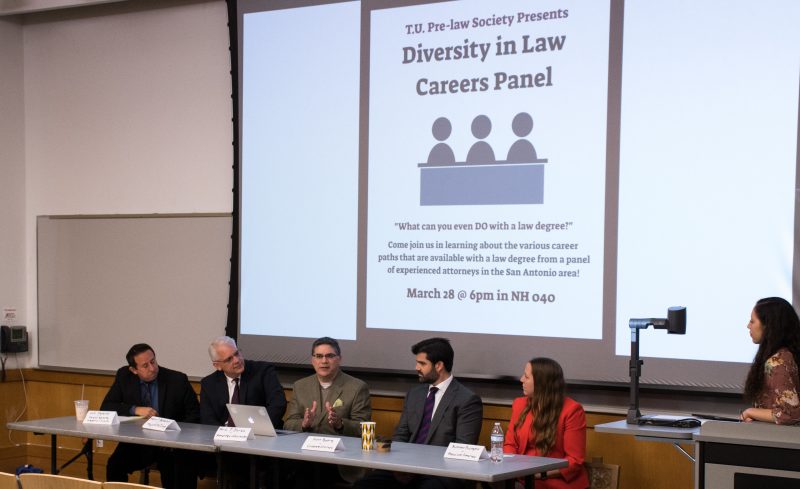TU Pre-Law, a club focused on preparing students for a future in law, brought five lawyers from various backgrounds and specialties to Trinity University on March 28 to inform the student body of the types of law they could study, tips about law school and life as a lawyer.
The panel consisted of Henry Bemporad, federal district court magistrate judge; Aric Garza, attorney and arbitrator; Matt Pepping, corporate attorney; Summer Bruington, associate attorney; and Luis Figueroa, executive director of the Texas senate Hispanic caucus. The latter three are Trinity alumni. TU Pre-Law reached out to the lawyers with the help of Alumni Relations.
“We think it’s very valuable for you all to know what exactly you can do with a law degree, and what paths are open to you,” said Zabdi Salazar, junior and president of TU Pre-Law.
The crowd consisted of about five students, those that did attend found the law panel to be very useful.
“[The lecture] was very beneficial. I liked how they had lawyers from multiple different backgrounds. It was awesome that they had corporate lawyers, but they also had public interest lawyers, and I think they did a very good job of covering a wide range of topics from what [the lawyers] do today to what they think you should do for law school,” said Julia Shults, junior.
Like most students that attended, Shults is planning on pursuing law school, which was reflected by the students’ questions in the open forum.
The presenter opened up the panel to describe differences in their work and their path to law school. Just about every area of law was covered between panel members, but as stated by Bemporad, all law shares a common mixture.
“As a lawyer you have to find where you’re happiest in how much people stuff you do and how much concept stuff you do,” Bemporad said. “I think all of us have a little bit of that experience … we do work with concepts, but we’re representing people. That’s what we do, we get to mix those two things.”
Garza agreed with this sentiment.
“Truly at the core of what we do we is solving someone’s problem. Now there may be an adverse party with a different solution to a problem, and that’s why you need a litigator to advocate one person’s position over the other,” Garza said.
Students present were particularly interested in the process of getting into and surviving law school, since a few of them were about to graduate and begin this process. The panel’s consensus was to be well prepared, since law school is rigorous, but that there’s no one right way to go about both school or your career.
“I think [when you go to law school] is an individual decision. At least when I applied, there were some schools that wouldn’t even look at you if you hadn’t taken a gap year. I went straight through, and I wish I’d taken a gap year,” Pepping said.
Through the hour-long forum, the students were given a glimpse into where a potential future in law school could lead and what possible paths they could take.







